Recent graduate Adina Nelu studied MA Music, with her specialist pathway of composition here at Salford – after completing her undergraduate degree in her home country in Romania. Since studying here, Adina has taken advantage of many career and life changing experiences. I spoke to Adina about her time as a postgraduate student and also about how the University of Salford has continued to aid her practice long after graduation.
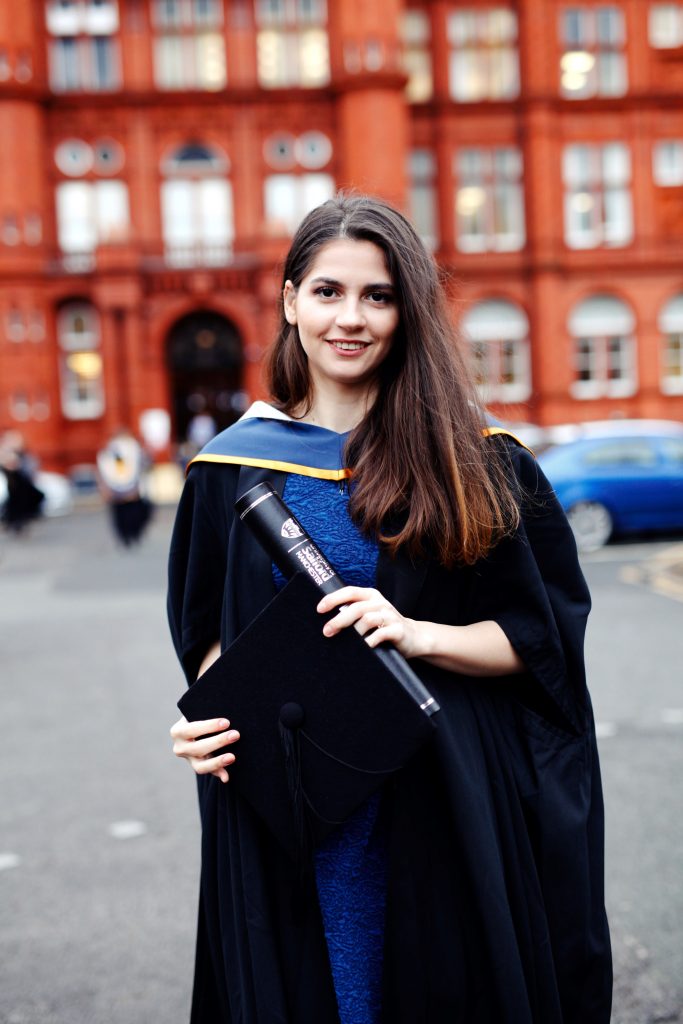
Photography: Alex Nelu
Hi Adina! First of all, could you tell us a little bit about yourself?
Hello! I am from Pitești, Romania and I’ve been a musician my entire life. I started studying flute and piano performance when I was 11, became a singer-songwriter in college, toured the country for 3 years as a backing-vocalist and flautist for one of my favourite Romanian artists and now I’m here, pursuing film scoring and media composition professionally. As per my interests, I am hopelessly in love with reading, mostly about history, mythology and folklore – these beautiful stories sometimes find their way into my creative process, becoming an integral part of my musical story-telling. I also have a quiet passion for mobile photography (yes, that’s a thing) – some of my shots have even been featured on the Clifford Whitworth Library postcards a few times.
What did you study for your undergraduate degree and where?
For my undergraduate degree, I studied Popular Music Composition at the National University of Music in Bucharest, Romania. During my 2nd year there, I discovered film scoring and I was instantly drawn to it.
How have you found the transition from studying an undergraduate degree to a postgraduate degree?
My undergraduate course was surprisingly classically-oriented and extremely focused on theory, so, during my time there, I was lucky enough to gain a profound understanding of music theory, harmony, orchestration and so on. The master’s course here at Salford finally allowed me to apply that knowledge in a very open, practice-based environment and expand the limits of my personal style. I consider this transition to have been the final step towards my stylistic freedom and I am very grateful to the people that guided me through this process during both of my degrees.

Photography: Claudia Savu
What was your experience like on your postgraduate degree? What type of things did you get up to?
I have to admit I was a bit intimidated by the University at first: the amazing facilities and resources, the willingness to help and openness to collaboration of both students and staff, along with the industry opportunities, opened a whole new world of possibilities for me that took me by surprise. I quickly learned that whatever my musical ambitions were, Salford offered the tools, resources and environment to make it happen. During my course, I had my first instrumental pieces performed live by someone other than myself, which is quite the achievement for a studio composer!
For my final project, I had the chance to make an old dream of mine come to life: writing music for poetry. I chose to work with the poetry of Mihai Eminescu, a Romanian poet that is very close to my heart, translated by Corneliu M. Popescu – a young man who managed to beautifully translate into English an entire volume before tragically dying at the age of 18 in a catastrophic earthquake that destroyed most of Bucharest back in 1977. His work is now deemed to be among the most valuable translations of Romanian literature.
I got in touch with some BA (Hons) Media and Performance students and they agreed to record some poems for me. They were brilliant! Not only did they bring to life some of my favourite poems, but they gave them an emotional dimension that later set an organic flow to my creative process. After selecting and editing the best takes, I used their individual performances as the starting point of my compositional process, assuming the role of a second translator, this time, into music. Rediscovering these poems in this context was by far one of the most profound musical experiences I’ve ever had and being a student here was an essential part of making it happen. Throughout the entire process I had so much help and support from my supervisor and tutors, whose enthusiasm for the project was comparable to mine.
Did you take part in any type of work experience whilst studying at Salford?
Thanks to my master’s course, I’ve had a lovely and unexpected encounter during my second trimester here in regards to work experience. For my Ethnomusicology module, I chose to focus my research on the Romanian wooden flute, which is a rudimentary version of the western flute that we know today, and I did my fieldwork in Romania during Easter break last year. I got in touch with one of the last traditional flute makers of Romania, Marin Predusel, who was kind enough to take some time to meet me. After interviewing him about his life as a flute maker and performer and the delicate art of handcrafting wooden flutes, I was invited to his workshop where he showed me through the stages of creating a musical instrument out of nothing. For that short amount of time, I became his apprentice and I know that one day I’ll be making my own flutes using the vast knowledge he shared with me that week. I filmed and documented his entire process and shared my findings in a presentation. I ended up learning how to play the instrument and became passionate about Romanian folk and folklore, which has become an important influence in my composition and performance. I never thought that studying here would help me better understand and embrace my cultural heritage, but I’m grateful that it has!
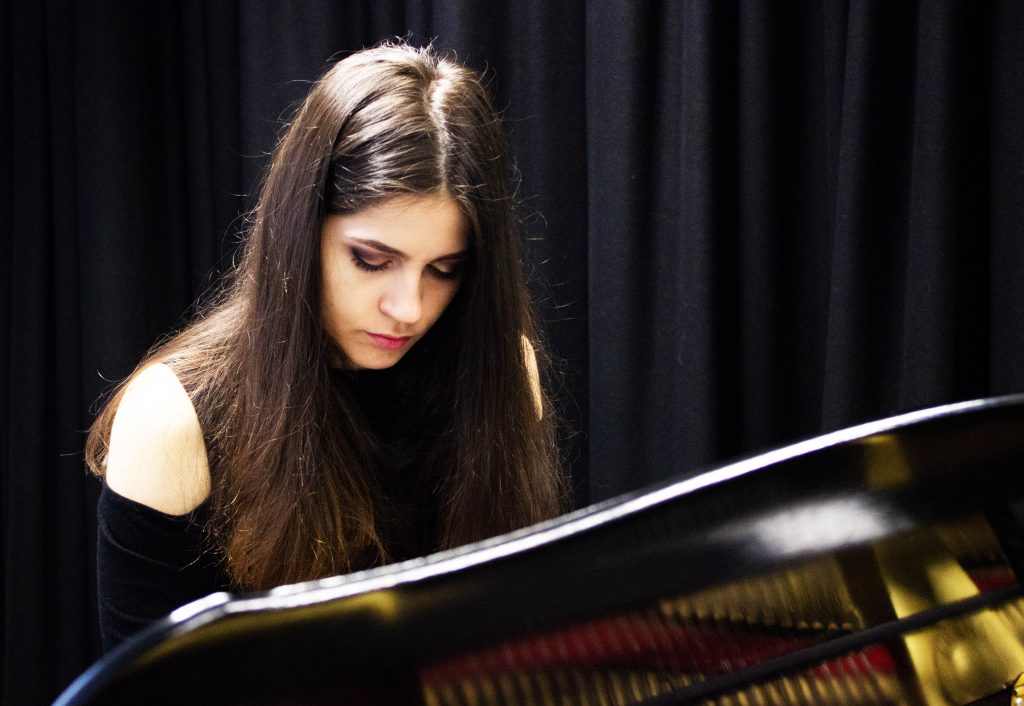
Photography: India Booth
Did you take part in any collaborations with other students whilst you were studying here?
There is a module called Applied Composition which requires every composition student to collaborate with an artist from another medium. There are meetings where School of Arts and Media students are encouraged to pitch their work to potential collaborators. Thanks to those, I was involved in numerous student projects as a composer: I wrote music for a few short films and documentaries, for animation and art installations. All of these collaborations taught me so much about how to work with a client and helped me understand the role of functional music and how it serves the visuals, which was a huge step towards my career as a media composer today.
Moreover, my involvement with the ensembles led to a musical collaboration with another recent graduate who plays the West African kora harp in the ensembles. Together we’ve been working on an ambient set of flute and kora music that we played at Band On The Wall earlier this week, and we’re thinking of recording an EP in the near future.
Why did you choose to study at Salford?
My brother was still a postgraduate student when he suggested I joined him here to study, telling me about the impressive facilities and industry links that the University has. I also remember googling some of my soon-to-be lecturers, being amazed at their achievements and thinking to myself: “These are the people I want to learn from”. I now know that I made the right choice.
Tell us more about the ensembles which you are a part of
The World Music Group is led by our Ethnomusicology Lecturer, Jostine Loubser, and students from all cultural backgrounds are encouraged to bring forward the stylistic traits of their culture and explore others’ as well. We have a diverse repertoire ranging from Transylvanian folk songs to West African tunes, Indian classical fusion and some wonderful Greek dance pieces!
The ACMG is an experimental contemporary group led by Professor Alan Williams where we basically do everything we were advised against back in music school – every piece we play has its own set of rules that don’t necessarily coincide with those of classical music and that’s why I love this ensemble. Our instrumentation ranges from micro-tonal electronics, to the unique RAPH (Reverse Action Piano Harp), designed by Lecturer Phil Brissenden. I play the flute in both ensembles, but for this one I use a pedalboard to synthesize and alter the sound of my instrument in real time. We only play two concerts a year and we never repeat our repertoire; I am proud to say that my piece Ode to Silence recently premiered at our last concert, which was an amazing experience for me.
Both of these ensembles offer a much-needed space for alternative musical exploration and are wonderfully diverse!
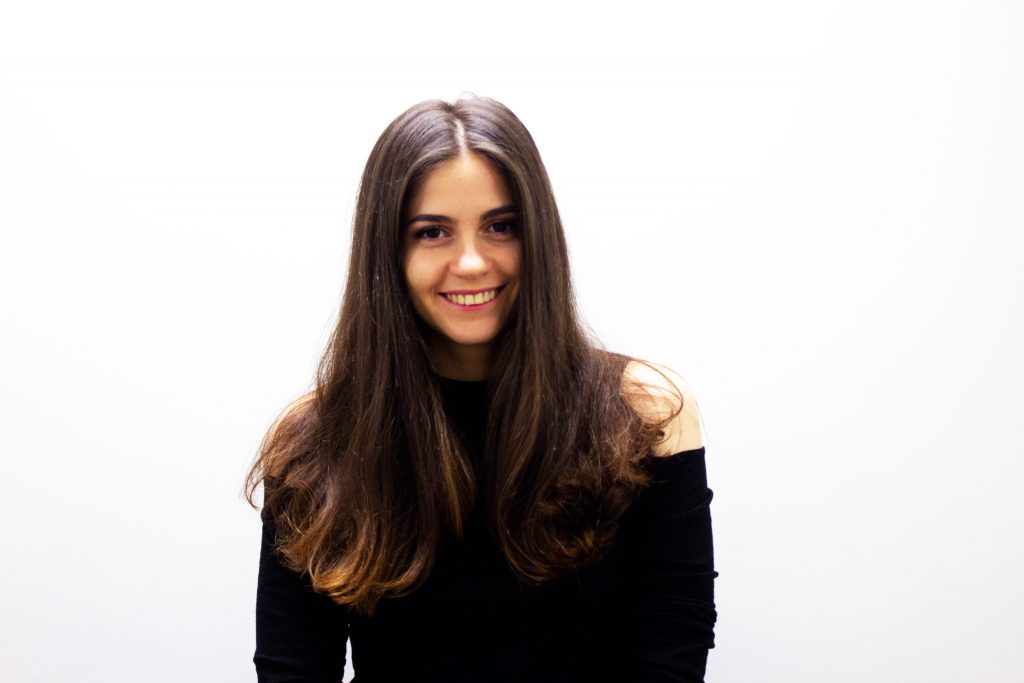
What’s been your favourite part about studying here?
First of all, it’s the people. Apart from being incredibly skilled and knowledgeable, the academic and technical staff are so kind and they won’t hesitate in stepping outside of their expected responsibilities to help a student. As a recent graduate, whenever I asked my former tutors for guidance, they agreed to meet me and discuss potential career paths for my professional development and treated me no differently than they would their current students. In my experience, the University of Salford truly cares about its students long after their graduation.
Secondly, I cannot stress enough how useful the facilities are! For example, the practice rooms are equipped to meet every student’s needs, regardless their style and the size of their band, the Mac suite offers the tools necessary for any creative assignment and so on. All of these played an immense role in my development as a postgraduate student.
As an avid reader, I instantly fell in love with the Clifford Whitworth Library – there are so many useful books on music and the leisure reading section was crucial to me whenever I needed a break from research. Last but not least, I became very attached to the splendid Peel Park, where I still go to read whenever the weather allows for it.
How is your postgraduate degree going to help towards your future career plans?
During my postgraduate degree, I gained so many creative and technical skills that helped elevate my work to professional standards, so it’s already helping me in that matter. Long term, I’ve benefited from being a part of an exceptional alumni network – the School of Arts & Media students and graduates are so talented and there’s always room for collaboration.
I heard you’ve written music for a feature film! Could you tell us more?
Yes! Soon after my graduation, I was hired to score my very first feature film. Up to that point, I had only worked on short projects, so you can imagine my excitement upon finding the news. Casa din Copac (Tree House) is a Romanian independent film directed by Florin Brinza that deals with the long-term consequences of domestic abuse – a very powerful message that was a challenge to convey musically. I feel so lucky to have been offered this amazing opportunity so early in my career and grateful that my time at Salford prepared me for such a project.
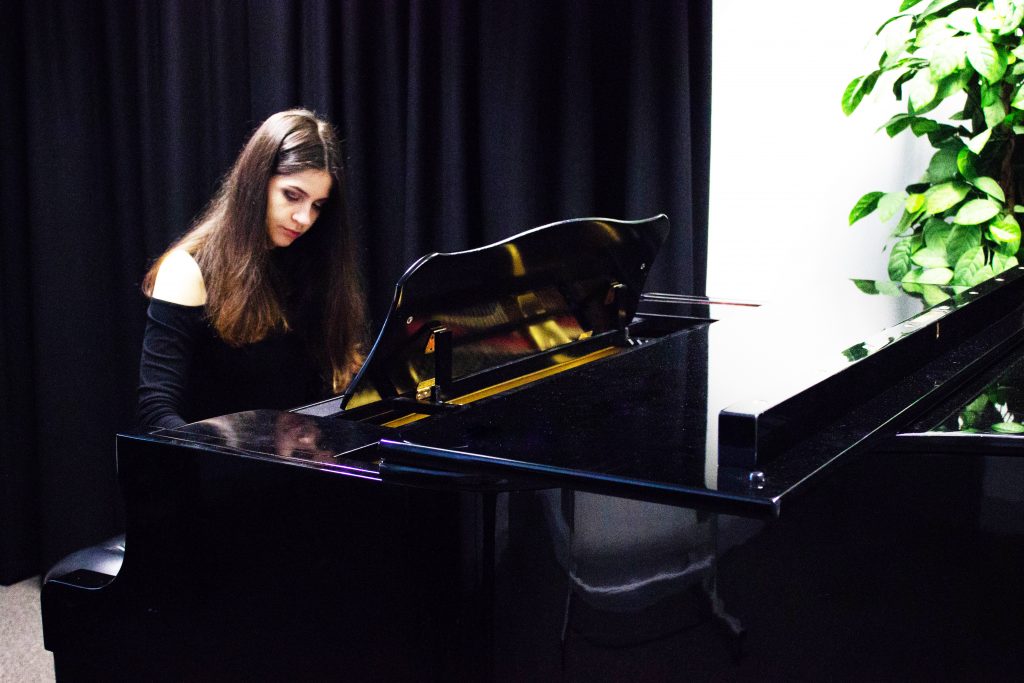
Photography: India Booth
Do you have any exciting opportunities coming up in regards to your career?
Remember when I mentioned having been a singer-songwriter before getting into media composition? After immersing myself in composition for 6 years, I’m now slowly reconnecting to that creative side of my 18-year old self: my plan is to write and record an indie-pop album and release it sometime next year! It’s been so long since I sat down and worked on a song and I’m really curious as to how my film scoring skills would translate within a popular music context.
Another thing that I’m doing at the moment, which I am extremely excited about, is my free score initiative for beginner filmmakers. A few months ago, I decided to offer my services completely free of charge to one project per month. To be clear, this is not something that I do for industry professionals – my offer is directed towards film students and recent graduates who can’t afford to pay for an original score and end up using music libraries, or worse, copyrighted music. I strongly believe that they should be given the chance to work with real composers so that they have an integral experience of film making. I got such a positive reaction from the filmmakers that sent me their submissions: some of them admitted that they were considering not using any music before reading about my initiative. I’m currently working on the first project and I’ve got a few others on hold. I intend on making this an integral part of my practice and keeping it up long-term.
Other than that, there are a few exciting projects coming my way. I recently created the soundtracks for some of GLAMOUR Magazine’s (Romania) digital covers, which took me in a whole different stylistic direction than my usual work – creating a modern sound worthy of the fashion scene. As a result, this attracted a different audience which I’m intending to keep by taking up more similar projects. That’s why I love media composition: you never know where the next project will take you, stylistically and professionally.
Adina has so much ahead of her with her career, following her passion for her practice and using this to gain outstanding opportunities within her industry with the University of Salford helping her along the way. Studying here has provided her with the platforms and communication for her career journey. If you’re interested in studying music here at Salford, check out the links below! ⬇
Undergraduate courses:
🎵BSc (Hons) Music, Production and Sound Science
🎵BA (Hons) Music: Creative Music Technology
🎵BA (Hons) Music: Musical Arts
🎵BA (Hons) Music: Popular Music and Recording
🎵BA (Hons) Music: Popular Music and Recording with Foundation Year
🎵BA (Hons) Music: Musical Arts with Foundation Year
🎵BA (Hons) Music: Creative Music Technology with Foundation Year
🎵BSc (Hons) Music, Production and Sound Science with Professional Experience
Postgraduate courses:
🎵MA Music

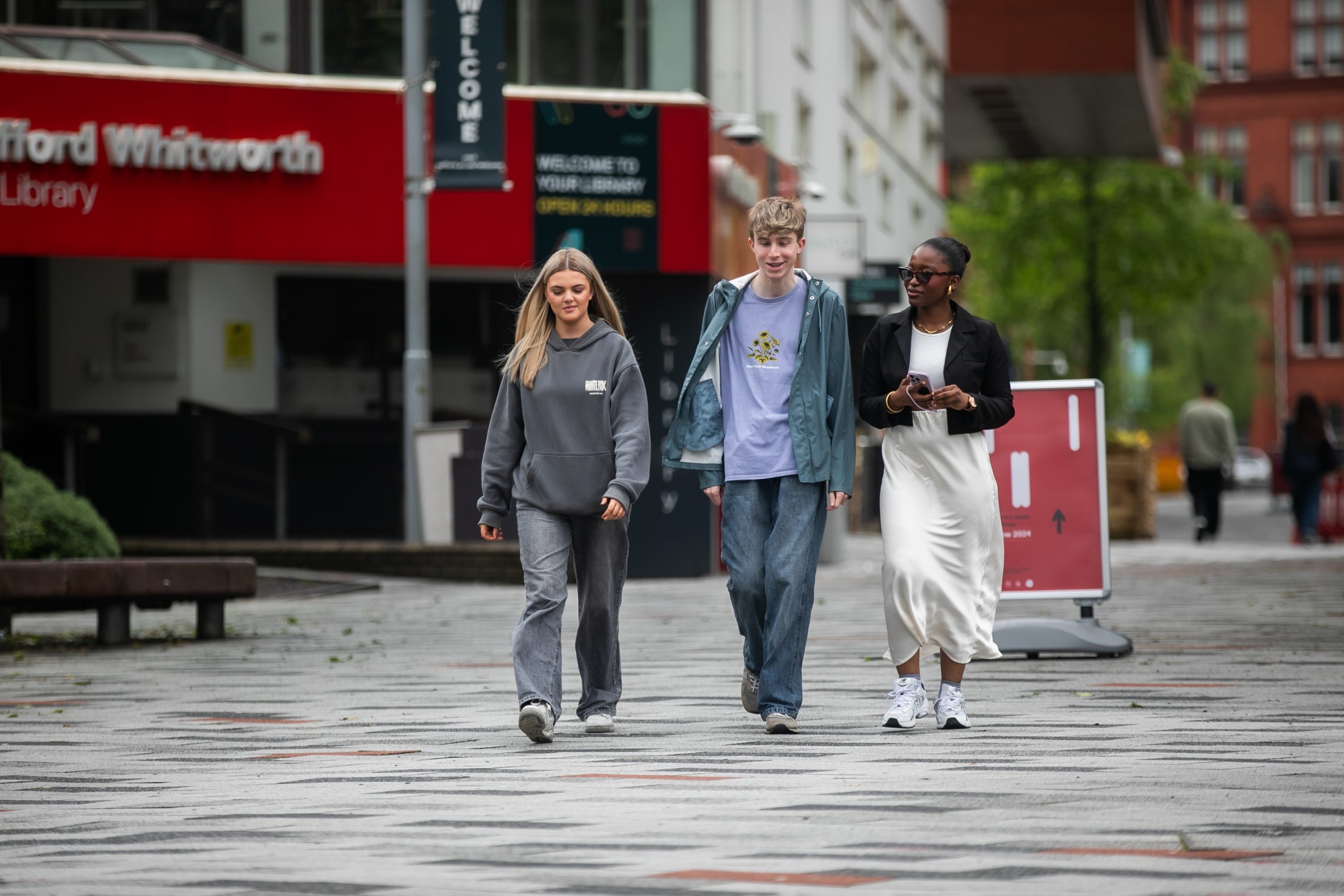

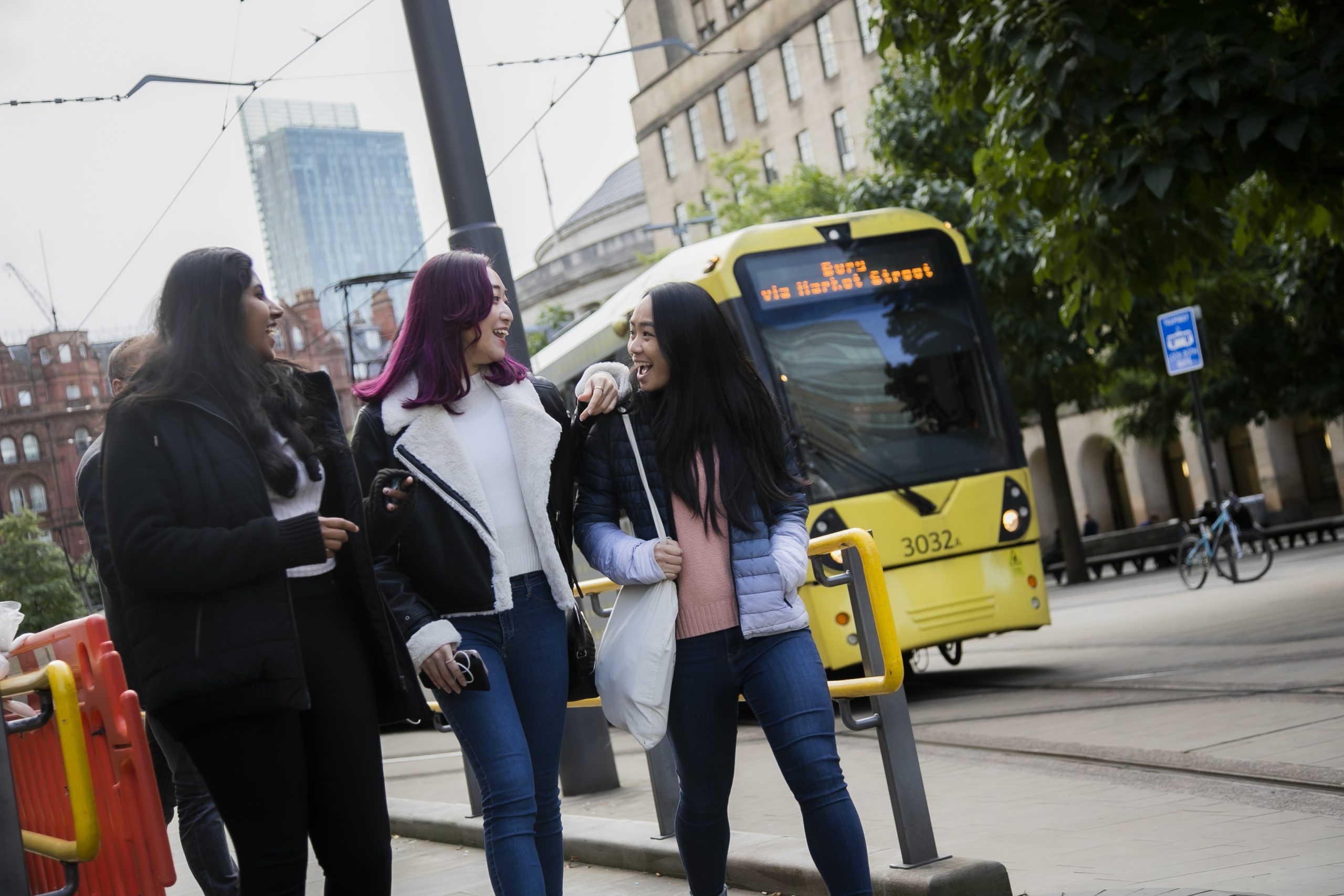


Wonderful, inspiring article. thanks.